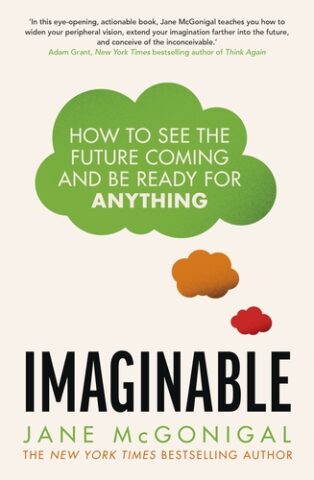Gear up to shape a better future
Have the recent crises left you thinking that the worst is now a real possibility or even just around the corner? The truth is you can help create a better future right now – without any anxiety or despondency – by embracing the mindset and tools of the futurists.
Are you scared about the future, afraid that more “black swans” and unpredictable crises lie in wait? Burying your head in the sand will foster anxiety. But if you anticipate the future using the scenario technique and battle against your cognitive biases, you’ll be much better prepared. And you’ll also contribute to creating a better future.

Imaginable by Jane McGonigal (Spiegel & Grau, 2022).
The challenge
The future is already here: you just can’t see it
Have the major crises over the past few years (the pandemic, for example, or extreme weather events and mass migration) come as a surprise to you? Most of these had been forecast by experts, who –naturally enough – alerted the powers-that-be and even the general public… only for their warnings to fall on deaf ears.
It was destined to happen.
It is only after the event that we “discover” reports, studies or simulations that addressed issues such as pandemics, monstrous forest fires or the risk of migration. Yet everyone found themselves powerless and overcome by surprise. The knowledge is partly already there: but it doesn’t equip us for the future as long as it remains at the stage of knowledge rather than the planning stage.
We have mental blocks. Why did you have the (mistaken) impression that the recent crises could not have been predicted? Our brains didn’t register the alarms raised by the experts due to a number of cognitive biases:
- Distance bias: Our brains have a natural preference for the present, where our survival is at stake. When they try to look towards the future, they do so impersonally without involving you.
- Denying reality: Is the situation (regarding the climate, for instance) at a critical level today? Our brains reassure themselves with the belief that “It won’t happen because we’ll find a solution.”
- Learned helplessness: Our brains have incorporated the idea, whether it’s justified or not, that they can’t act and resign themselves to inaction.
- The Dunning-Kruger effect: After a few searches on the internet, our brain thinks it knows more than it really does, and challenges what experts say: “They’re wrong: I did my own research.”
These biases result in a state of unpreparedness and an element of surprise when the predicted disaster does actually take place.
© Copyright Business Digest - All rights reserved




